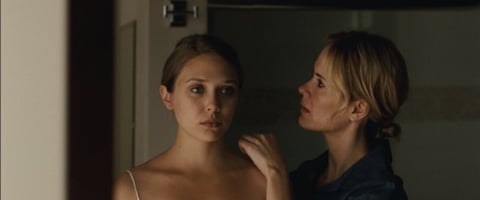Is it strange that Martha Marcy May Marlene is the third movie about a cult I’ve seen in the last few days? Is it even stranger that I watched it in a communal living room with 17 of my closest “brothers and sisters” while our mother figure made soup from homemade stock and our father figure polished his blade against the “whooping” strop? I’m only allowed a half-hour on the typing machine, so I’d be wise to get this review done in a right hurry. Sean Durkin’s full-length directorial debut, the aptly abbreviated (if you’re into clannish chicks) MMMM, is a near-perfect example of how to tell an expanded story while only working with pieces from the middle. We don’t quite know the beginning, and the end isn’t even an issue. Most films of this nature drive home a character’s backstory before introducing the cult, sequentially playing out the daily trials and tribulations before shit goes downhill and escape is necessary. And many times, they can be as boring as that sentence was. But here, we experience only the lingering aftermath, where shallow wounds healed by time are surrounded by gaping holes of psychological turmoil.
Elizabeth Olsen’s star turn as Martha relies as much on her expressiveness, or lack thereof, as any dialogue or actions rendered. She fibs her way back into good graces with sister Lucy (Sarah Paulson) after a two-year absence, staying with her and husband Ted (Hugh Dancy) at their lakeside vacation house. So assimilated into the quasi-hippie farmhouse existence, under the subtle menace of leader Patrick (John Hawkes), Martha’s behavior is at first acceptably eccentric but soon becomes maddeningly paranoid and troublesome. Paulson plays Lucy as loving and compassionate, but with just the right amount of judgment that makes Ted, lacking in depth as he is, at least react realistically. Lucy seems like the kind of person who couldn’t go a day without bitching to Ted about something, probably the carefree Martha, her polar opposite.
Through seamless juxtaposition, Durkin connects Martha’s present and recent past through locations and actions, giving viewers glimpses of an initially cogent lifestyle soon riddled with violence and sexual dominance. This works two-fold, as we realize these flashbacks aren’t just for our benefit. This is regressive shock cascading into a mental breakdown. Martha needs to second-guess everything she’s been through, from pseudo-relationships with Watts (Brady Corbet) and Patrick (who coins her cult name “Marcy May”), to friendships with Zoe (Louisa Krause) and Katie (Marla Dizzla). Once you’ve lived through something like this, concepts such as “right and wrong behavior” lose most of their meaning, and their differences are indistinguishable. And seriously, will Brady Corbet ever make a movie that doesn’t make me uncomfortable?
In highlighting the farmland’s warm expansiveness, setting few scenes in the same place twice, Durkin allows viewers to toy with the idea that its positives may outweigh the negatives, especially when compared to Lucy and Ted’s large, colorless, personality-free home. The ever-powerful Hawkes, in short bursts of screen time, presents Patrick as gently parental, though rough around the edges. (Especially the “take you from behind while you’re sleeping” edges.) The relative ease in which Martha is able to escape the group’s clutches casts doubt on her paranoia, but this just makes the tension all the more strangling.
Again, it would all be for naught without Olsen’s masterful solemnity. Each smile feels genuinely fought for. Each look of distress is conveyed with frightening ease. Her widened eyes in the final seconds are somehow more lasting than the film’s already haunting previous 100 minutes. Wholly more than the sum of its scattered parts, Martha Marcy May Marlene is as understated and captivating as it can possibly be, ushering in hopefully lengthy careers for both starlet and director. Though Durkin speaks in the all-too brief "Making of MMMM" about wanting the grain of the film to show through, it’s not often that it does, and it actually looks somewhat awful in between positively crisp and gorgeous wide-open scenes. Indie movies rarely look this pristine. The sound aspects are only worth mentioning in brief, as the entire film is just dialogue and a softened score.
“Mary Last Seen” is the rare short film that serves as an addition to the feature rather than a previously filmed inspiration. Filmed as Durkin was finishing the feature script, it expounds upon the tactics someone like Watts uses to snare outsiders into the group, such as removing external communications and wearing the person down mentally and physically. Interesting and beautifully shot for a miniscule budget, this is the only feature to appear on both Blu-ray and the DVD.
The features exclusive to this disc are all basic and quite short, so I guess they’re worth the time. “The Psyche of a Cult” looks into the mindset and methods that hold these groups together, such as the guise of individual thought. “The Story” is mostly Durkin talking about wanting to write a cult script. “The Making of MMMM” has a few of the cast and crew members talking about locations and shooting. People talk about Elizabeth Olsen in “Spotlight on Elizabeth Olsen.”
My favorite of these features is John Hawkes’ music video for “Marcy’s Song,” an extended, studio-recorded version of a pretty folk song Patrick wrote for Martha in the film. It isn’t amazing or anything, but I kept singing it after listening to it, and the oddball intensity on Hawkes’ face is reminiscent of a coked-out Springsteen. Watch it here.
This film definitely joins the original Wicker Man and Kill List in the trifecta of awesome cult movies. But more than just that sub-genre classification, it’s a personal character study of a damaged female unlike many we’ve seen before. Martha is victimized, but she’s not quite a victim. She’s a survivor. And the only Olsen with onscreen talent.

Nick is a Cajun Country native and an Assistant Managing Editor with a focus on TV and features. His humble origin story with CinemaBlend began all the way back in the pre-streaming era, circa 2009, as a freelancing DVD reviewer and TV recapper. Nick leapfrogged over to the small screen to cover more and more television news and interviews, eventually taking over the section for the current era and covering topics like Yellowstone, The Walking Dead and horror. Born in Louisiana and currently living in Texas — Who Dat Nation over America’s Team all day, all night — Nick spent several years in the hospitality industry, and also worked as a 911 operator. If you ever happened to hear his music or read his comics/short stories, you have his sympathy.
One Thing Ben Affleck And Jennifer Lopez Have Allegedly ‘Agreed’ On After Their Divorce: ‘If They Can’t Stand To Be In The Same Room As Each Other…’
I've Been Watching Celtics City On Max, And There's A Non-Basketball-Related Element I Really Appreciate
'All My Aloha': Jason Momoa Just Wrapped Filming As Lobo In The Most Jason Momoa Way Possible











